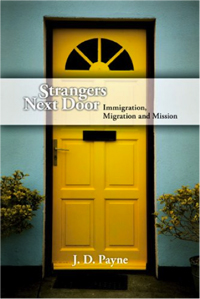
DARREN CRONSHAW on a book he says convinced him more than any other on the need to reach out to newcomers in his neighborhood..
JD Payne
Strangers Next Door: Immigration, Migration and Mission
InterVarsity Press, Downers Grove, IL, 2012
ISBN-13: 978- 083085756
 |
“For any church wanting to ‘advance the Kingdom’, being aware of and strategic about people from less reached cultures coming to us is basic.” |
In my neighbourhood 36.9 per cent of people were born overseas (higher than Australia’s 30.2 per cent). Locally this includes 4.6 per cent people from India (more than triple the national 1.4 per cent) and 3.5 per cent from China (more than double the national 1.5 per cent). Australia is a country of migrants, and our local area even more so. My church, AuburnLife Baptist Church, shares a building with our Baptist mission agency, Global Interaction. As we send missionaries overseas, the nations are coming to us. This is not just a feature of my parish, but a globalised trend the church all over the West is seeing with all sorts of opportunities.
‘Diaspora Missiology’ is the emerging and exponentially growing field that brings migration research into conversation with mission. Strangers Next Door is a concise and accessible introduction to the field. It is compiled by JD Payne, a seminary professor, author and pastor who currently serves as pastor of church multiplication at The Church at Brook Hills in Birmingham, Alabama.
The book offers Biblical perspectives on migration and especially the conviction that God is orchestrating a movement of peoples across the world to advance the Kingdom of God. For any church wanting to ‘advance the Kingdom’, being aware of and strategic about people from less reached cultures coming to us is basic. Payne comments: “Something is missiologically malignant when we are willing to send people across the oceans, risking life and limb and spending enormous amounts of money, but we are not willing to walk next door and minister to the strangers living there.” The God of mission is organising for the church in the West to engage in global mission on their doorstep, without relocating. This does not remove the need for missionaries to other countries, but it is an important parallel strategy in discipling all nations.
Another contribution of the book is a description of the scope of migration. Payne detailed how Australia has among the highest international migrants per capita. Australia welcomes a huge and growing number of international students, up to 464,955 students with visas arrived 2010-2011, especially from China, India, Malaysia, Korea and Indonesia. These are figures our church wants to pay attention to; situated next to a university with a growing number of international students. We also need to consider the 21,805 refugees and 3,706 pending cases of asylum seekers (2010 figures). Moreover, a relevant statistic Payne did not write about, is that in 2001-2011 Australian Baptists grew by 43,000 people, but 98 per cent of this growth was from migration! Our Australian Baptist churches desperately need to welcome and invite the contribution of migrants and their cultural diversity. But Payne offers statistics and stories from all around the Western world helpful for churches also in North America and Europe.
Finally, there are inspiring stories and advice on how to reach and send migrants with the Gospel. The Western church needs practical advice for offering hospitality to students and migrants who are often lonely, isolated and vulnerable, and open to discussing the Gospel. But we also need principles, once they meet Christ, to train and commission them for mission to and beyond their cultural group. As explored in Lausanne’s Capetown 2010 consultations, Payne advocates a multi-dimensional approach to mission; from and to all nations rather than from the West to the rest. Moreover, we need mission ‘to’ diaspora people who come to us, ‘through’ them as we send them back to their home countries, and ‘beyond’ them as we encourage them to engage in cross-cultural mission. In God’s economy, migrants can often reach and connect with other cultures that Anglo Westerners are less able to, thus functioning as ‘bridge peoples’. Payne has an optimistic view of the mission potential of migrants, refugees and students and uses the acronym REPS to explore how to Reach, Equip, Partner and Send. He counsels starting with the vision that you will reach and then send people back to their home country rather than aim to assimilate them, and that when they go you can go with them and use their social networks to start organic churches.
People moving across the globe are among some of the world’s unreached and least reached peoples. Payne liberally uses Unreached People Group (UPG) language, which assumes an idealised view of culture and arguably a pre-globalised era. New anthropological insights, as Michael Rynkiewich elsewhere explains, are recognising that people are not neatly dividable into ethnic cultural groups and that cultural identity and diversity are much more complex, and exacerbated by migration and urbanisation. Nevertheless, the point remains that some of the world’s people who have least access to the Gospel are now moving as strangers next door to Christians in the West, and it is appropriate to echo Payne’s prayer: “May the strangers next door that you meet this morning become your brothers and sisters in the Lord this afternoon and go to the nations later this evening.”
Strangers Next Door, more than anything I have read, convinced me of the need for prioritising intentional outreach to students and newcomers in my neighborhoood, and the need for further research and sharing ideas on diaspora missiology among the broader Australian and global church.
A shorter version of this review was originally published in Mission Studies 31 (2014), 467-468.
To buy this book, follow head to Strangers Next Door: Immigration, Migration and Mission.





